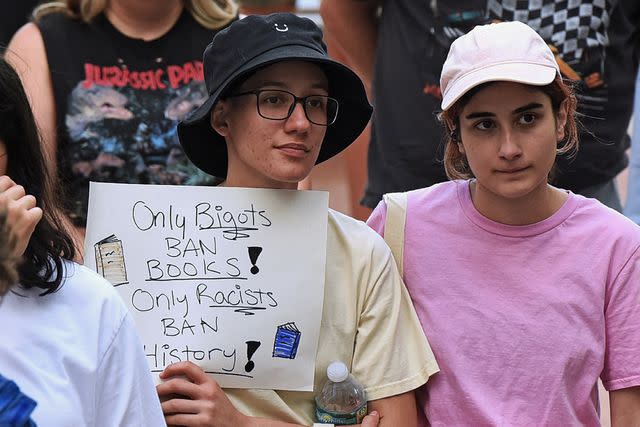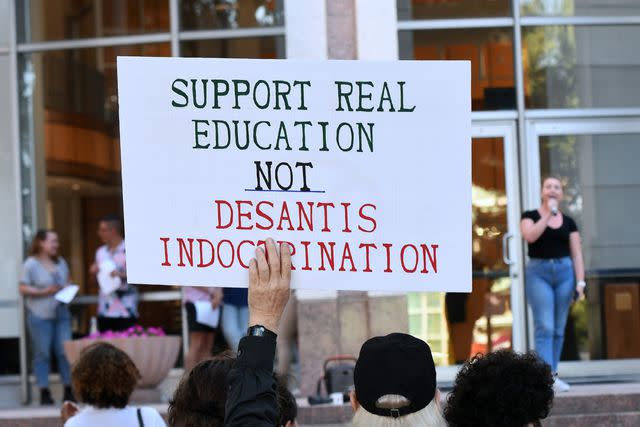Florida AP Teacher Reveals Education Struggle Under DeSantis: ‘What Class Will They Get Rid of Next?’
- Oops!Something went wrong.Please try again later.
As Florida becomes a hotbed of discussion about banned books and banned courses, high school educator Dr. Robert Hovel tells PEOPLE he worries about what the future has in store for the state's students
As Florida becomes a hotbed of discussion about banned books and banned courses, one longtime educator worries about what the future has in store for the state's students.
"The hot topic among teachers right now is: What class will they get rid of next?" Dr. Robert Hovel tells PEOPLE in a recent interview.
Hovel has for years taught AP Psychology at Lyman High School in Seminole County. But he says he was surprised to learn that the course was effectively banned just days before the start of the 2023-2024 school year.
That's when the College Board (the organization that oversees Advanced Placement courses) said the course would no longer be taught in Florida due to recent laws passed that ban teaching "foundational content" about sexual orientation and gender identity.
Related: Ron DeSantis Moves to Apply Florida's Restrictive 'Don't Say Gay' Law in High School Classrooms
The announcement that AP Psychology had been banned in Florida ignited controversy not entirely unfamiliar: a proposed AP course on African American history was rejected by the administration of Florida Gov. Ron DeSantis in January, due to it "[lacking] educational value" and being "contrary to Florida law."
The ban of AP Psychology sent administrators and teachers like Hovel scrambling.
"It's one of the kids' favorite AP classes [and] it's one of the more enjoyable ones," he says.
When he alerted students that the class wouldn't be moving forward, and that the students enrolled in the class would instead be taking an AP Seminar, "they just started dropping it," he adds.
But the ban would prove short-lived, with Florida Education Commissioner Manny Diaz Jr. responding to the controversy days later in a letter sent to school superintendents indicating the state was not preventing school districts from teaching the course.
"In fact,” Diaz wrote in the letter, “the Department believes that AP Psychology can be taught in its entirety in a manner that is age and developmentally appropriate and the course remains listed in our course catalog."
"Once they approved AP Psychology, my class numbers actually went up," Hovel says. "These kids want to understand human behavior, and it's a really fun curriculum that is not in any way, shape or form harmful."
And while AP Psychology is safe for now, the way Florida teachers instruct and interact with their students has been reshaped by recent laws, such as the Parental Rights in Education bill, which DeSantis signed into law in March 2022.

Paul Hennessy/Anadolu Agency via Getty
Protestors oppose Florida's restrictive new education policies surrounding instruction on gender, sexuality and raceThe measure, also known as the "Don't Say Gay" bill, initially banned the classroom teaching of “sexual orientation or gender identity” from kindergarten to the third grade, or "in a manner that is not age appropriate or developmentally appropriate for students in accordance with state standards."
In May 2023, DeSantis signed legislation that further prohibited school instruction on sexual orientation and gender identity subjects through the 12th grade.
Hovel, who is openly gay, says the measures have so far not impacted his personal day-to-day teaching environment, but he worries about how the laws could shape the students themselves.
"My school district is extremely supportive and they want kids to get the knowledge," he says. "We are very forward-thinking. The fact that I'm gay is not an issue. ... But in other districts, there is a fear of, for instance, wearing a rainbow shirt."

Paul Hennessy/Anadolu Agency via Getty
Protestors stand outside Orlando City Hall to express dissatisfaction with Florida's new conservative education policies, spearheaded by Gov. Ron DeSantis' administration and Republican state lawmakersOther rules are making teaching harder, he admits, citing a recent rule that mandates students get their parents' consent before using a nickname or other non-legal name in schools.
"Teaching isn't what it was 10 or 11 years ago," Hovel says. "Now, if a kid wants to be called by a nickname, I have to have their mom sign a form ... and that's clearly directed at a segment of the population for kids who are trans."
As Hovel acknowledges, critics of the nickname mandate have argued that the measure was designed to target kids who are transgender and wish to go by a name other than their given one. While the measure may have been intended to target the LGBTQ+ community, in practice, it targets all students — and their teachers.
"There's a Florida teacher shortage because nobody wants to teach here," Hovel says. "The people who are making education laws here have no real education experience and have not been in a classroom other than as students."
The result, Hovel says, is that the education system in Florida is "starting to get limited."
He cites a new academic standard that requires Florida middle schools to teach students that enslaved people "developed skills" that "could be applied for their personal benefit."
"That's a middle school standard," Hovel says. "Not even high school. Why is a middle schooler learning that slaves learned essential skills? How racist."
He continues: "I do worry how some of these kids will fare in the real world. It's not fair to be robbed of learning things like AP African American History. It's not fair to the kids to limit what they're allowed to learn."
The feeling, he says, is shared by many educators across the state and throughout Florida schools.
"There's always been an us-versus-them mentality with administrators and teachers, but I've never seen more people agree on something than they do on how ridiculous some of the education laws are in Florida. All the way up to the principals' office, there's a feeling of, Really?"
For more People news, make sure to sign up for our newsletter!
Read the original article on People.

